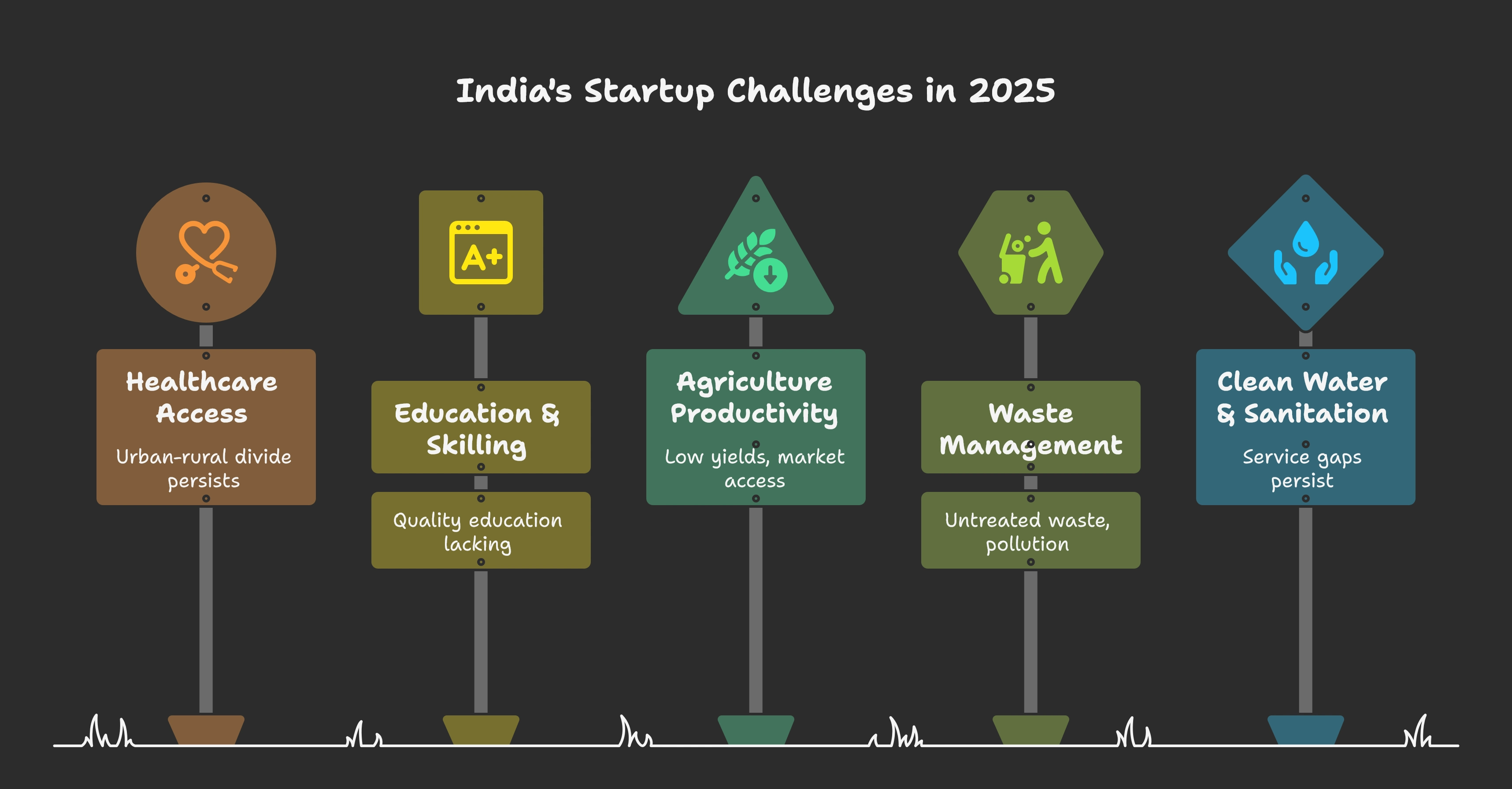12 Real Problems in India Startups Must Solve in 2025

India’s startup wave is transitioning from valuation-chasing to solving large-scale socio-economic problems. With over 159,000 startups across 650+ districts and a $140B output contribution, the focus is now on impactful innovation that drives inclusive growth. Below are 12 urgent problem areas ripe for scalable startup solutions, along with market opportunities and examples.
1. Healthcare Access - Bridging Urban-Rural Divide
The Problem: Nearly 70% of Indians[1] in rural areas face acute doctor shortages (1 doctor per 11,000 patients vs WHO's 1:1000), limited hospital beds (40% availability), and must often travel far for care. 75% pay out-of-pocket, risking debt from health emergencies.
Startup Opportunity: Telemedicine platforms (Practo, Tata 1mg) and AI diagnostics (Qure.ai, Niramai) connect remote patients with specialists and affordable testing to provide remote healthcare solutions. Government initiatives like eSanjeevani (311 million consults to date) and Ayushman Bharat Digital Mission drive adoption.
Market & Impact: Telemedicine projects to grow from $3B in 2024 to $20B by 2030. Startups save lives by expanding quality care and lowering costs for millions.
2. Education & Skilling - Quality for Emerging Towns
The Problem: Only 5% of India’s workforce[2] is formally skilled; rural and tier-2/3 cities lack quality teachers and resources. Learning poverty remains a barrier despite India’s youth population advantage.
Startup Opportunity: This creates opportunities for scaling Edtech organically. Giants like BYJU’S, Unacademy, and local language platforms such as Doubtnut are already delivering quality lessons and vocational courses via smartphones to underserved areas.
Market & Impact: From $700M in 2020 to a forecasted $30B by 2030, improved education lifts employability and economic growth.
3. Agriculture Productivity - Smart Farming and Market Access
The Problem: Agriculture employs 46% of workforce but contributes only 18% to GDP due to low productivity, small-scale farming, and waste (40% produce spoilt pre-sale).
Startup Opportunity: Agritech startups like DeHaat (farm inputs + AI advisory), Ninjacart (farm-to-retail supply chain), and CropIn (sensor-based smart farming) boost yields and direct market linkages.
Market & Impact: Agritech market expected beyond $24B by 2025[3]. Startups improve food security and farmer incomes for 120M smallholders.

4. Waste Management - Urban Cleanliness Crisis
The Problem: India generates 160,000 tonnes of municipal waste daily; 80% untreated. E-waste grew 73% to 1.75 million tonnes in 2023-24, with only 43% formally recycled, causing pollution.
Startup Opportunity: Waste recycling marketplaces like Recykal, e-waste recyclers like Attero, and plastic upcyclers Banyan Nation reduce landfill, pollution, and create jobs.
Market & Impact: Plastic recycling to reach $2.3B by 2030; solutions help cities embrace green technology and create livelihoods.
5. Clean Water & Sanitation - Service Gaps Persist
The Problem: Despite Jal Jeevan Mission reaching 80% rural tap water coverage, 40M rural households still lack piped water. 70% wastewater is untreated. Urban water shortages and sanitation maintenance remain challenges.
Startup Opportunity: Startups like Swajal provide IoT-powered water purifiers and water ATMs; GARV Toilets offer solar-powered e-toilets; Fluid Robotics monitors water quality.
Market & Impact: Clean water tech market grows $5B by 2025 with direct health benefits and gender inclusivity from improved sanitation.
6. Financial Inclusion - Banking the Unbanked
The Problem: Over 55 crore Jan Dhan accounts opened, but 20% inactive. Low-income groups lack affordable credit, insurance, and tailored financial products.
Startup Opportunity: Neobanks like Jupiter, microfinance platforms Kaleidofin, and AI-based lenders KreditBee provide vernacular access to digital banking solutions and microloans. UPI drives 20+ billion monthly transactions.
Market & Impact: Fintech to hit $150B market size by 2025; wider inclusion enables economic empowerment and safety nets.
7. Job Creation & Livelihoods - Fixing Employment Gaps
The Problem: India needs over 90M new jobs by 2030. Youth unemployment is high; many underemployed. Skill mismatch and gig worker instability persist.
Startup Opportunity: Platforms like Apna match blue-collar workers with local jobs; GigIndia, Urban Company is reshaping gig work with better earnings and benefits; UpGrad upskills youth digitally.
Market & Impact: Online recruitment market grows rapidly, aiding 28M discouraged workers back to jobs, fostering entrepreneurship.
8. Affordable Housing - Urban Shortage Crisis
The Problem: Urban affordable housing shortage hits 9.4 million units in 2025, rising to 30M by 2030. High land costs and regulatory delays worsen slums and commuting hardships.
Startup Opportunity: Platforms like NoBroker eliminate rental brokers; co-living startups NestAway optimize space for affordable rents; construction-tech startups cut costs via prefab methods.
Market & Impact: Affordable housing tech is lucrative and socially vital; provides safe homes improving lives and productivity.
9. Traffic Congestion & Urban Mobility - Growth vs Gridlock
The Problem: Indian cities suffer severe traffic congestion, wasting hundreds of hours yearly per commuter, increasing pollution and stress.
Startup Opportunity: Ola and Uber ridesharing reduce car use; electric taxi fleets like BluSmart cut emissions; micromobility via Yulu and Bounce offer last-mile EV options; smart traffic management tech optimizes flow.
Market & Impact: Urban mobility market booming; reduced congestion boosts productivity and environment.
10. Climate Change & Clean Energy - Urgent Transition
The Problem: India is a major emitter, faces climate risks, and still relies 60% on coal power. Air pollution affects millions; renewable adoption is a must thus having a renewable energy strategy becomes equally important.
Startup Opportunity: Solar providers Fourth Partner Energy and battery innovators Log9 Materials enable clean power; Carbon platforms Climes.io trade credits; air quality sensors Ambee monitor pollution; Kheyti aids climate-smart farming.
Market & Impact: Renewable energy investments scale; clean energy employs millions; startups address global and local climate goals.
11. Supply Chain & Logistics - High Cost Inefficiencies
The Problem: Logistics cost 14-18% of GDP versus 8-10% in developed countries. Fragmented trucking, checkpost delays, and weak cold chains spoil goods and raise costs.
Startup Opportunity: BlackBuck optimizes freight with digital load matching; Delhivery enhances last-mile delivery; Ninjacart innovates cold-chain for fresh produce; warehouse-as-a-service enables flexible storage.
Market & Impact: Improving logistics with AI can save $50B+ annually, boost exports, and enhance consumer experience.
12. Healthcare Insurance - Financial Protection Gap
The Problem: 73% of Indians lack health insurance, exposing families to financial ruin from medical costs. Traditional insurers focus on urban segments; complexity deters adoption.
Startup Opportunity: Insurtech Acko and Digit Insurance offer easy digital policies; AI underwriting by Artivatic.ai enables instant coverage; bite-sized microinsurance protects against specific risks.
Market & Impact: Insurance premiums projected $250B+ by 2025. Increased coverage promotes health security and hospital accountability.
Conclusion
In the context of India’s problem-solution landscape, GrowthJockey acts as an enabler that transforms well-intentioned ideas into viable, impact-focused enterprises. Whether it’s a corporation looking to launch a new solution for small business or a startup addressing urban mobility, GrowthJockey’s venture architecture model ensures the venture is built on solid fundamentals and is ready to scale.
By blending strategic design with execution and using tools like Intellsys.ai to harness AI, GrowthJockey significantly enhances the chances of success for new ventures. Their experience of having built 25+ ventures means they have battle-tested frameworks to navigate common startup challenges – be it achieving product-market fit or optimizing unit economics – which they apply to each new project.
FAQs On Real Problems in India That Startups Can Solve
Q1: How to choose which problem to solve?
Pick one significant, validated problem you deeply understand and can address effectively with a scalable solution.
Q2: What major problems can tech solve in India?
Healthcare access, education quality, agriculture productivity, urban mobility, financial inclusion, clean water/sanitation, climate change, logistics, and insurance are key areas.
Q3: What challenges do Indian startups face?
They often struggle with product-market fit, funding, talent acquisition, regulatory hurdles, and infrastructure gaps.
Q4: Any niche startup opportunities?
Regional language content, waste segregation incentives, heritage preservation tech, accessibility apps for differently-abled, and rural last-mile logistics are promising.
Q5: What everyday problems affect many Indians?
Traffic jams, pollution, water shortages, power cuts, unreliable transport, internet issues, waste, bureaucratic delays, price inflation, and public safety.








